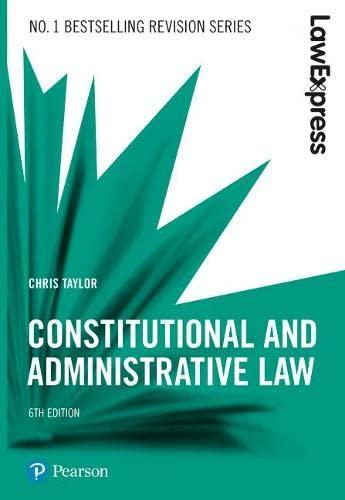Question
Scenario: Mary Jane and Allen Greene, a married couple, own a high-end costume jewelry manufacturing and distribution company called Greene's Jewelry Wholesale, LLC. The principal
Scenario:
Mary Jane and Allen Greene, a married couple, own a high-end costume jewelry manufacturing and distribution company called Greene's Jewelry Wholesale, LLC. The principal place of business for Greene's Jewelry is in Derry, New Hampshire, where it owns a warehouse and two storefronts. Originally started in 1957, the company expanded over five decades, and it now employs 502 individuals in a variety of departments, including sales and marketing, research and development, human resources, and manufacturing.
The primary asset of Greene's Jewelry is its process for creating a synthetic gold-colored material called "Ever-Gold," which is used in Greene's necklaces, rings, earrings, and bracelets. Ever-Gold is impervious to scratches, discoloration, oxidization, and is marketed as "everlasting gold."
Jennifer Lawson, who has been employed for three years as a junior executive secretary in the research and development department at Greene's Jewelry, has just learned that she is pregnant. She has earned high marks on each of her annual reviews with the company, with the exception of the fact that she routinely shows up 15 to 30 minutes late for work. Otherwise, she is deemed to be professional, articulate, diligent, and skilled in her role with the company. When Lawson advises the head of human resources, Lisa Peele, that she may have to take additional time off as a result of some high-risk factors that she will face during the course of her pregnancy, she is told that her position has been eliminated. The specific words are: "Congratulations Jennifer! That is exciting news for you. We do not need to worry about time off, though, because, regrettably, I was just going to let you know that we are downsizing and no longer have a need for any of our junior executive secretaries."
Jennifer is distraught, and immediately returns to her desk to clear it out as instructed. She removes all of her personal items, as well as the projects she was working on prior to her discussion with Lisa Peele. When she returns to her home, she realizes that she has inadvertently taken a draft letter to Greene's patent attorney, which details the secret process for creating Ever-Gold .
Although Greene's Jewelry requires all of its executives to sign covenants not to compete and confidentiality agreements, Jennifer was only required to sign a confidentiality agreement, by which she agreed never to disclose any information that she might acquire from Greene's regarding the process used to create Ever-Gold.
Panicked, and knowing that she needs a job, she calls one of Greene's competitors, Howell Jewelry World, and advises its hiring manager that she is a former employee of Greene's, that she needs a job, and that she has confidential information about Ever-Gold that would help Howell compete with Greene's. The hiring manager at Howell, Naomi White, schedules an interview with Jennifer for the following day.
At the end of the interview, Naomi makes an offer to Jennifer to begin work with Howell immediately, but she conditions the offer on Jennifer's execution of an employment contract. The contract contains two specific provisions that Naomi insists Jennifer read and initial, in addition to signing the contract as a whole. One of those provisions states that Jennifer will disclose the information she has regarding the Ever-Gold process prior to commencing work with Howell. The other provision is a covenant to not work for any competitor of Howell for two years after she leaves the employ of Howell, irrespective of the reason for leaving, and whether she quits or is fired. Jennifer initials both of the provisions, signs the contract for employment, and gives Naomi a copy of the letter that she removed from her desk at Greene's.
One week after she starts working with Howell, Jennifer is fired for chronic tardiness, and she thereafter gets a job working as a sales associate with the only other jewelry company in town, Triumph Jewels.
Meanwhile, Greene's learns that Howell has acquired knowledge of the secret process used to create Ever-Gold, and that Howell has tweaked the process slightly so as to avoid any patent infringement issues but to still create a product with similar characteristics and qualities of Ever-Gold. Howell, for its part, has learned that Jennifer is working for a competitor and fears that Jennifer will disclose the process to Triumph. Finally, one of Howell's customers had developed a disfiguring rash as a direct result of the new process Howell has begun using in its jewelry.
Greene's sues Jennifer for breach of the confidentiality agreement when it learns that she has given confidential information to Howell. Jennifer counter-sues Greene's for wrongful termination. Howell sues Jennifer for breach of the covenant not to compete, and Jennifer counter-sues for fraudulent inducement, believing that she was tricked into signing the employment contract with Howell and that Howell was never interested in hiring her, but was interested only in acquiring information on the process to create Ever-Gold. Howell also sues Triumph, claiming that it knew or should have known that Jennifer was subject to a covenant not to compete, and that Triumph should therefore be bound by its provisions.
Question:
Based on your analysis, how do you believe this situation may affect public perception of Greene? Will the public discourse reflect possible legal outcomes? Be sure to use specific examples.
Step by Step Solution
There are 3 Steps involved in it
Step: 1

Get Instant Access to Expert-Tailored Solutions
See step-by-step solutions with expert insights and AI powered tools for academic success
Step: 2

Step: 3

Ace Your Homework with AI
Get the answers you need in no time with our AI-driven, step-by-step assistance
Get Started


